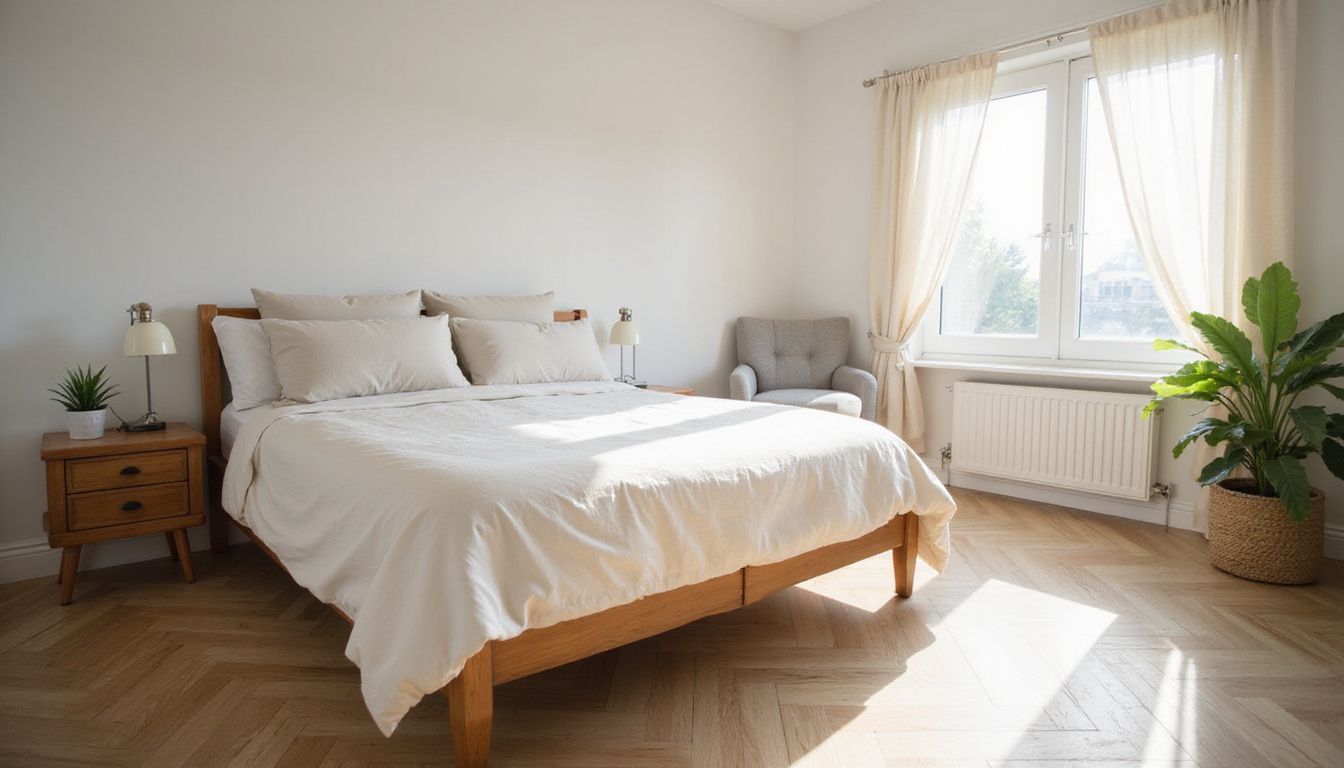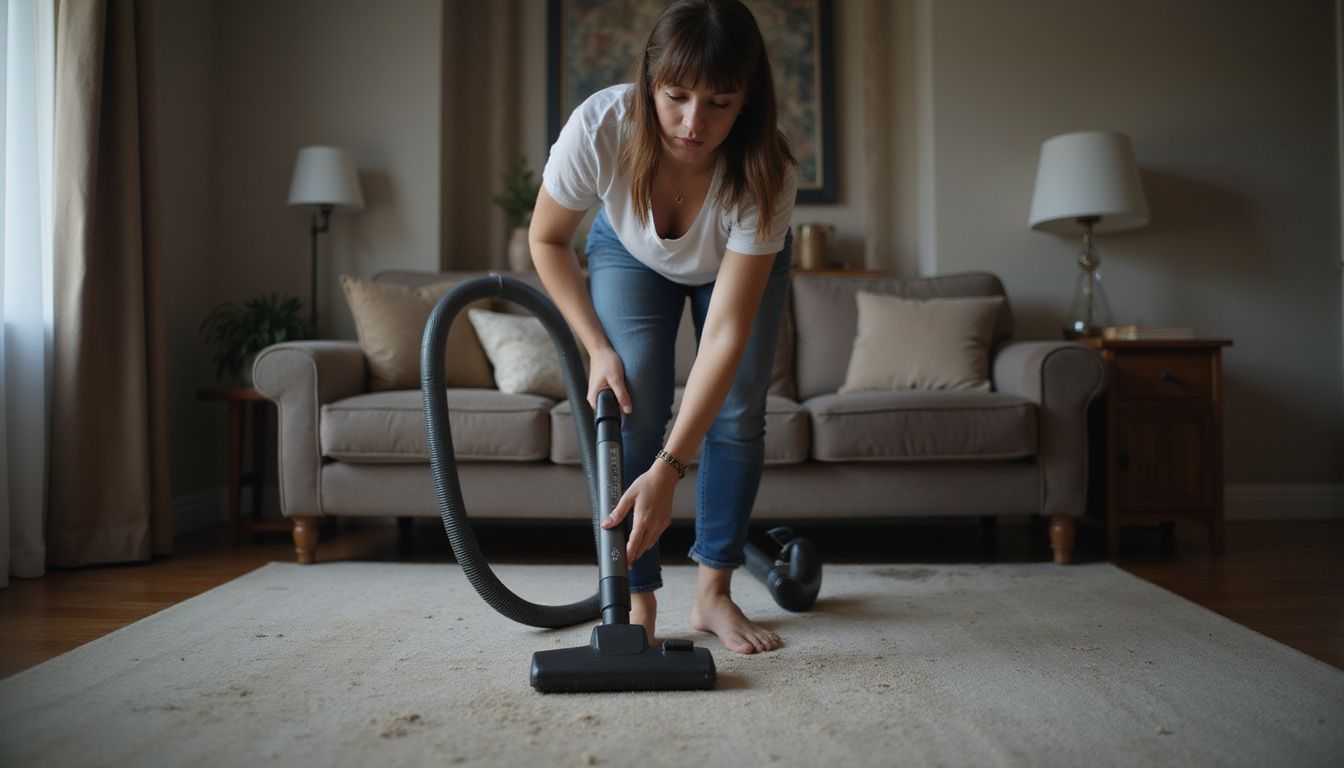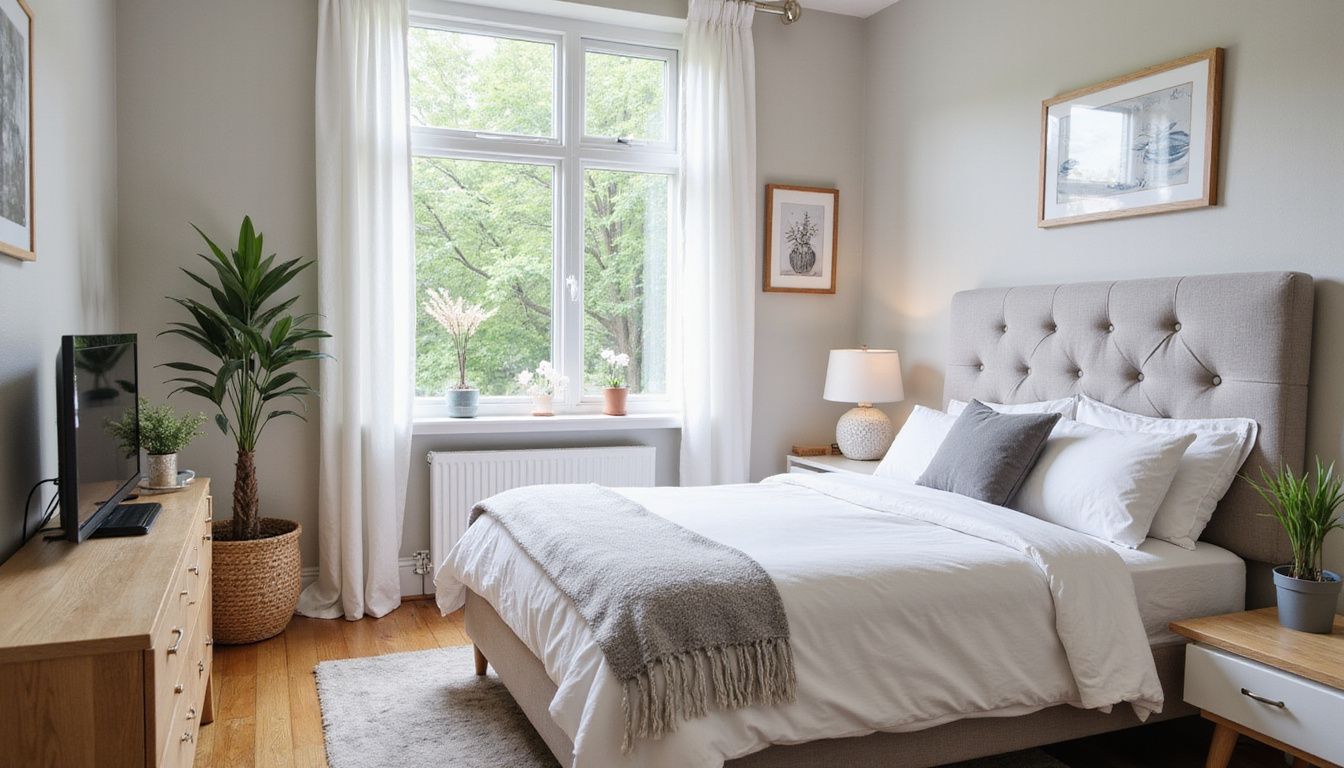Many homeowners feel worn down by daily stress, cluttered rooms, and messy living spaces. A disorganized home can disrupt sleep and heighten anxiety, making simple tasks more difficult than they need to be.
Studies have shown clear mental and physical health improvements linked directly with cleanliness at home. Experts agree that reducing clutter eases stress levels, improves focus, and supports better sleep in a clean bedroom environment.
This blog post explores the main Benefits Having Clean Home for families looking for practical ways to boost their health, happiness, and well-being. Keep reading to discover life-changing reasons why a tidy home truly matters.
Key Takeaways
- Keeping a clean home reduces allergens like dust mites and mold, improves air quality, prevents pests, and lowers the risk of asthma or allergy symptoms.
- Regular cleaning cuts stress and anxiety levels; cluttered spaces are linked to higher stress and depressive symptoms (2020 Korean study) while decluttering boosts productivity according to Dr. Peggy Loo and a 2011 study.
- An organized household saves valuable time National Association of Professional Organizers shows families lose about 55 minutes daily looking for lost items in messy homes and builds healthy habits in adults and children through shared chores.
- Maintaining cleanliness protects furniture, appliances, flooring from rapid wear or damage caused by dirt buildup; this routine care significantly reduces extra expenses on repairs or replacements over time.
- Eco-friendly housekeeping products such as Bon Ami effectively remove germs without harming family health or ecosystems, supporting healthier indoor environments sustainably.
Physical Health Benefits of a Clean Home

Walking into a clean bedroom is like taking a fresh breath of mountain air—crisp, clear, and calming. A tidy home cuts down asthma attacks and creates healthier indoor air quality with smart tools like HEPA filters.
Improved Indoor Air Quality

Regular deep cleaning boosts indoor air quality, clears out germs and cuts allergens. Dirty air vents gather dust mites, pet hair, mold spores and other particles harmful to physical health.
Clean vents help limit potential triggers of asthma attacks or allergy symptoms at home. Experts suggest using a HEPA filter in vacuum cleaners to capture tiny airborne pollutants effectively.
Dusting regularly with eco-friendly housekeeping products removes sneeze-causing irritants from surfaces around the house. Opening windows daily circulates fresher airflow throughout living spaces and bedrooms for better sleep each night.
Cleaner air indoors supports mental wellness by contributing to improved focus during daytime tasks at home or work. A clean bedroom also ensures family members wake feeling rested rather than stuffy-nosed or coughing from poor ventilation overnight.
Reduced Risk of Allergies and Respiratory Issues

A clean home cuts down allergens like dust mites, pet dander, mold spores, and pollen. These common irritants often settle into carpets, upholstery, curtains, and bedding.
Dust buildup on surfaces like shelves or blinds can trigger breathing problems for adults and kids who have asthma or sensitive airways.
Controlling moisture in areas like kitchens and bathrooms helps stop mold growth. Mold is a sneaky culprit behind many allergy flares and respiratory troubles at home. Keeping windows dry with brief daily wipe-downs reduces harmful substances floating around indoors.
Similarly, disinfecting frequently touched spots such as kitchen counters or doorknobs blocks germs from spreading illnesses among household members especially helpful during flu season in turn leading to better sleep and improved focus for everyone living there.
Prevention of Pest Infestations
Regular surface cleaning blocks pests from moving into the home. Bugs, rodents, and cockroaches look for leftover food scraps or forgotten crumbs as easy snacks. Sweeping floors daily and wiping kitchen counters right after meals remove these tempting treats that attract unwanted guests.
Consistent removal of clutter also limits hiding spots where pests thrive. Keeping rooms tidy reduces dark corners and piles of junk where insects hide to breed rapidly in secret.
Homeowners who tackle moisture issues early lower their risk too, by reducing mold growth and damp areas favored by insects like silverfish or centipedes. Leaky faucets under sinks or dripping pipes in basements create ideal habitats for many household invaders if left unfixed.
Persistent monitoring helps spot signs of infestations quickly so action can follow fast before bugs multiply out of control, ensuring better sleep without the worry of crawling critters at night.
Next up is mental health how a clean bedroom affects emotional well-being throughout busy days spent juggling families’ needs alongside life’s demanding schedules at work or school activities kids love so much!
Mental Health Benefits of a Clean Home

A clean bedroom can feel like hitting a mental reset button after battling burnout all day. Deep cleaning goes beyond dust and grime it clears the mental clutter too, bringing better sleep and peace of mind.
Reduced Stress and Anxiety
Living in a cluttered space often adds to stress and anxiety for homeowners and parents. Dr. Peggy Loo points out that clutter around the home actually increases stress levels, making daily routines harder to handle.
Clear, tidy rooms provide coping strategies against burnout by creating calm, restful spaces especially a clean bedroom to help achieve better sleep each night.
Cluttered homes can even affect overall mental health; a 2020 Korean study linked poor housing conditions with higher rates of depressive symptoms. A separate research from 1997 showed childhood living conditions significantly impact adult health as well.
Consistent cleaning habits like regular deep cleaning sessions reduce worries and improve focus, leading residents toward happier moods, less tension, and improved emotional balance over time.
Enhanced Focus and Productivity
A cluttered room often distracts the brain, making concentration difficult for homeowners and parents alike. A 2011 study found that decluttering helps enhance mental clarity, leading to improved focus during tasks such as work or helping children with homework.
Keeping a clean bedroom or workspace supports productivity by limiting visual distractions like messy piles of laundry or scattered paperwork. Clean homes provide areas free from disorder, allowing individuals to think clearly and tackle daily responsibilities efficiently.
Deep cleaning key spaces fosters better organization habits while boosting overall mental health through improved focus and less stress.
Improved Mood and Emotional Well-being
Cleaning the house actually boosts happiness. The act of deep cleaning releases endorphins, hormones that lower stress and pain while increasing emotional well-being.
Parents especially benefit from improved focus after completing tasks in tidy rooms, leading to calmer interactions with their family members.
Better sleep also results from having a clean space since a messy room can trigger restless feelings at bedtime. Waking up refreshed means fewer cranky mornings for parents and their kids alike, creating smoother starts each day.
Improved mental health paves the way for practical benefits homeowners enjoy next.
Practical Benefits of a Clean Home

A clean home gives busy parents extra time for family fun curious how else tidying up helps your daily routine?
Saves Time by Reducing Clutter
Clutter-free spaces help parents and homeowners save valuable time. Searching for keys, misplaced homework, or TV remotes wastes precious minutes each day. Families waste around 55 minutes daily looking for items in messy homes according to the National Association of Professional Organizers.
By organizing items into clear categories like dedicated baskets for shoes by the door, labeled bins for toys in bedrooms, or designated folders for important paperwork the stress of searching disappears.
With fewer distractions and improved focus, clean home environments lead to increased productivity throughout the day.
Organized spaces keep household chores quick and simple too. Deep cleaning tasks become easier when surfaces stay free from clutter piles and random objects scattered everywhere.
Having an efficient system encourages choosing organized habits naturally without extra effort involved, making way smoothly into further discussion on organizing living areas effectively “for Better Efficiency.
Organizes Your Space for Better Efficiency
An organized home simplifies daily life and saves valuable time. Assigning specific storage bins or shelves for children’s toys reduces the minutes spent searching under beds or behind couches.
Clearly labeled containers in pantries prevent parents from digging through cluttered cabinets during meal prep. Keeping laundry sorted into separate hampers allows quick wash cycles, giving busy homeowners extra moments to relax or enjoy better sleep.
Arranging household items logically supports mental health as well by reducing stress and chaos. A tidy desk with neatly stacked papers helps adults improve productivity at remote jobs, enhancing focus and lowering anxiety levels throughout the workday.
Decluttering closets regularly through deep cleaning eliminates wasted hours deciding outfits each morning, making family routines smoother overall while promoting emotional well-being within a clean home environment.
Encourages a Sense of Accomplishment
Completing a deep cleaning task boosts motivation, creating an immediate sense of accomplishment. Finishing chores around the home triggers positive feelings, lifting mood and emotional well-being.
Homeowners and parents often feel energized by tidy spaces to tackle other tasks during the day. Productivity increases when rooms stay clutter-free since there are fewer distractions for both kids doing homework and adults working from home.
Maintaining order at home promotes mental health benefits like better sleep and experiencing lower stress levels every day.
Social Benefits of Maintaining a Clean Home

A clean home makes visitors feel right at ease, almost like sinking into a comfy couch. Tidiness can also set the stage for memorable family dinners and cozy movie nights.
Creates a Welcoming Environment for Guests
Having guests over can feel stressful, but keeping a tidy home eases that worry. Cleaning surfaces regularly and deep cleaning carpets removes dust and grime, enhancing social readiness for visitors.
Clear pathways also help spot hazards like cluttered walkways or slippery floors ahead of time. Guests entering well-organized homes often sense comfort right away, boosting their moods and creating an atmosphere ripe for pleasant conversations.
Mental health improves too a neat room brings calmness not just to homeowners but to visiting friends as well. Relaxing sofas without piled items invite people to unwind easily after arrival.
Open spaces free of mess allow carefree chats without distractions or embarrassment from unexpected disorderly surprises hidden behind couch pillows.
Promotes a Positive Family Atmosphere
A tidy home teaches valuable life skills for every family member. Kids who help with chores like sweeping, cooking nutritious meals, or sorting laundry learn responsibility early on.
Simple tasks such as cleaning the kitchen or putting toys away create chances for laughter and teamwork. These shared moments foster family bonding and improve everyone’s mental health by lowering stress levels at home.
A clean room becomes a bright space where conversations flow easily between parents and kids.
Clear spaces also enhance harmony among siblings, reducing petty arguments over misplaced belongings or cluttered areas. Families find themselves chatting more at the organized dinner table rather than scattered around messy counters piled high with dishes.
Regular upkeep of common living spaces creates easygoing environments that invite open dialogue within household routines, leading naturally into building healthy habits together.
Builds Healthy Cleaning Habits
Keeping a regular cleaning schedule helps households build healthy cleaning habits. For instance, setting daily non-negotiable tasks like wiping kitchen counters after meals or putting laundry away promotes consistency and reduces stress.
Tackling one area at a time according to energy levels makes chores manageable instead of overwhelming.
Family members become proactive participants by delegating simple tasks like vacuuming carpets, dusting shelves, or sorting mail. Kids who learn basic housework early often grow up feeling responsible in other areas too.
Over time, organized routines turn home upkeep into second nature for everyone involved.
Economic Benefits of a Clean Home

A clean home keeps your furniture and appliances in top shape for longer, saving cash down the road. Plus, tidiness helps households avoid rushed spending on replacements and repairs.
Extends the Life of Furniture, Appliances, and Flooring
Dust and grime slowly harm furniture, appliances, and floors. Dirt in rugs grinds against fibers, causing quick wear and tear; sweeping or vacuuming carpets weekly stops this damage before it starts.
Regular cleaning of appliances like refrigerators, ovens, washers or dryers prevents buildup of germs that weaken parts over time. Household fixtures last years longer if homeowners remove dirt often protecting comfort and keeping extra cash in their pockets.
Reduces Costs Associated with Repairs and Replacements
Routine cleaning cuts down home repair costs for homeowners. Appliances such as refrigerators, washers, and air conditioners operate better with regular care. For example, removing dirt from appliance coils helps machines run smoothly and last longer.
Similarly, flooring like carpets or hardwood stays attractive if cleaned often to prevent stains or mold buildup. Consistent housekeeping preserves furniture too, preventing fabric wear and tear caused by accumulated dirt particles.
Simple checks during routine sweeping reveal safety hazards before they become expensive problems: clutter in hallways could lead to falls; wet spots might cause slips.
Staying ahead of small issues reduces surprise bills that eat into family budgets something every household appreciates.
Helps Avoid Unnecessary Purchases
Keeping a clean home reduces the natural urge to buy extra items. Organized rooms allow homeowners to see what they already own, avoiding buying duplicates of supplies or tools.
Clear kitchen cabinets, tidy closets, and neat storage spaces make it easy for families to spot needed items at once. Having designated spots for belongings prevents impulse shopping trips for goods families might already have tucked away somewhere.
Cleaning up clutter removes distractions that lead people toward unnecessary buying sprees. Less visual chaos means less temptation by flashy ads or new products promising quick fixes in messy spaces.
For example, organized pantries stop panic purchases at grocery stores because homeowners know exactly what’s on hand right now and what’s running low. Less clutter equals fewer unplanned expenses over time—keeping family budgets healthy and stress levels low.
How to Maintain a Clean Home

Keeping a home clean is easier with simple routines, teamwork, and smart cleaning supplies—curious to discover more tips?
Develop a Cleaning Routine
A simple cleaning routine helps homeowners keep their space neat without feeling overwhelmed. Setting non-negotiable daily tasks, like wiping kitchen counters or folding laundry immediately after drying, makes chores manageable and quick.
Each family member can dedicate about 15 minutes per day to easy tidying jobs such as sweeping floors or putting away scattered items.
Creating a weekly schedule also eases household stress. For instance, Monday could focus on bathrooms, Wednesday on vacuuming carpets, and Friday for washing bed linens.
Delegate Tasks Among Family Members
Establishing a cleaning routine becomes easier by dividing chores among family members. Assigning each person set tasks helps everyone share responsibility and develops strong life skills for children.
For example, younger kids can handle simple duties such as sorting toys or putting cushions in place, while teenagers manage tasks like vacuuming floors or wiping kitchen surfaces with eco-friendly cleaners.
Family teamwork also strengthens bonds and makes household maintenance feel less stressful and more fun. Parents could create a clear list noting daily or weekly jobs to prevent confusion and help keep the home tidy consistently.
Use Efficient and Eco-friendly Cleaning Products
Many household cleaners contain harsh chemicals that affect indoor air quality and irritate the skin. Choosing efficient, eco-friendly alternatives like Bon Ami keeps homes clean without harmful side effects.
Products made from natural ingredients fight germs and allergens effectively, protecting families and pets from breathing issues or allergic reactions.
Eco-friendly options reduce pollution in rivers and oceans each year by cutting back on chemical waste. Families who switch to green cleaning supplies help protect wildlife habitats too.
Stocking the cabinet with safe products builds better habits at home while setting a strong example for children about sustainability. Keeping these products handy makes it easier to stick with regular cleaning routines around the house.
Daily Cleaning Checklist
Consider a daily checklist to stay organized and support a clean home. Use this list as a guide each day:
- Make your bed immediately upon waking.
- Wipe kitchen counters and clean up after meals.
- Sort mail and put away important documents.
- Spend 5-10 minutes tidying living areas by putting away misplaced items.
- Sweep or vacuum high traffic areas if necessary.
This routine supports improved focus, better sleep, and overall mental health by keeping clutter at bay.
Conclusion
Having a clean home offers clear and practical benefits for family life. Tidying up rooms regularly helps eliminate allergens, improve indoor air quality, and prevent pests that carry illnesses.
Getting rid of clutter lowers stress levels and boosts mental clarity at work or school. Families with tidy spaces often find more time together, stronger relationships, and healthier daily routines.
Simple actions like making beds or wiping kitchen counters can lift moods by releasing pleasant endorphins. Creating simple cleaning schedules, assigning tasks fairly among family members, or choosing eco-friendly products can quickly transform household habits into lasting success.
A recent example from a local family showed that a disciplined deep cleaning routine improved their mental health and resulted in better sleep patterns. This case highlights how a clean home contributes directly to improved focus and physical health.
FAQs
1. Does a clean home really help reduce stress?
Absolutely! A tidy space helps your mind relax and breathe easier. Clutter can pile up worries like dirty dishes in the sink, while neat rooms lift your mood and lower anxiety.
2. Can keeping my house clean improve physical health?
Yes, indeed. Regular cleaning removes dust, germs, and allergens that cause illness or allergies. Think of it as giving yourself fresh air indoors your lungs will thank you later.
3. Will having a cleaner home boost productivity at work or school?
Definitely! When your surroundings are organized, it is simpler to focus clearly on tasks ahead without distractions pulling you away every five minutes.
4. Is there any connection between cleanliness at home and better sleep quality?
You bet there is! Sleeping in a clean bedroom feels calming; messy spaces keep minds awake with nagging thoughts about chores left undone like laundry whispering from across the room late at night!
Disclosure: This content is informational and not a substitute for professional advice. The studies and expert opinions mentioned are provided as cited sources.







Recent Comments